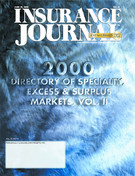Some California wholesalers have discovered a new marketing tool: offering continuing education seminars to their producers.
While many such seminars have traditionally been in rented spaces in hotels, banquet rooms and the like, a new trend is to take those courses straight to the producers themselves.
Phil Hill, assistant vice president of Anderson & Murison Inc. in Los Angeles, and Ron Abram, CEO and president of Abram Interstate Inc. in Citrus Heights, have both been teaching free CE courses for their respective companies for roughly a year.
While Anderson & Murison has been offering free CE seminars to its producers for about 20 years, Hill explained that the company wanted to do a bigger market push and bring more seminars to more people.
“We figured the most cost-effective way for us to do this was just to go directly to our producers’ offices,” Hill said. He added that in the past year, the company has held seminars for groups ranging in size from only 10-15 producers all the way up to as many as 200-300. “We also have been a big provider to professional insurance organizations here in California,” he added.
Once a date and time for the seminar has been set up, “we take care of the certificate of insurance process, the filing with the DOI, [and] practically everything else,” Hill said.
According to the California Department of Insurance, “[e]very person desiring to be a provider shall submit to the Commissioner a provider application…along with a filing fee specified in the California Insurance Code.” The Commissioner reserves the right to refuse to certify a provider under certain conditions.
Courses, which must be insurance-specific, must also be submitted to the Department for approval, and approved providers must assure that each course is taught or presented by an instructor who meets the qualifications set in the regulations. There is a 60-day waiting period for approval on new course applications.
In addition to the added exposure provided to companies, Hill emphasized other cost-savings benefits offered to seminar participants.
“If you have an office total of 10 or more producers, your CE budget could get large, depending on how much CE is required in a given year,” Hill said. “The [savings] could be quite substantial, especially when you consider that we’re willing to offer up to six free hours to however many producers you want…That is a tremendous incentive for the company.”
Abram said the seminars he teaches are also geared not just for the company’s own producers but also for other insurance professional groups. “We get an opportunity to provide a service for the agents while at the same time it allows us to give them a little familiarity with us and some name recognition,” he said. While those courses are generally free, some classes which require more detail than others may not be. “There is a [minimal] charge occasionally for the cost of the certificates,” he added.
The courses also come from various sources. For example, Abram explained that he works with another company, a licensed provider of courses in the state, which can facilitate either course approvals and/or certification processes. Additionally, there are numerous other classes that have been approved by that company that he has access to as a licensed CE provider with the state. He also has the option of doing it all individually.
Of course, one thing a course absolutely must have is appeal. Often, classes must be tailored to meet needs of the marketplace.
“If producers are interested in particular subjects, we’re always interested in hearing about that,” Hill said. “We can file courses for producers in advance.”
Hill said he currently teaches about six courses, filed for one credit hour each, which allows the producers flexibility in structuring the seminars according to the timetable they desire. “Currently, due to demand, we are filing three more courses for two hours each,” he said.
Although primarily viewed by wholesalers as a marketing tool, there is a very important aspect that must be kept in mind about the seminars. That is that no company self-promotion is permitted during the presentation on the state’s time.
“There isn’t an infomercial to our seminars,” Hill said. “In order to qualify for CE credit with the DOI, you cannot discuss your company while providing one of these lectures. But maybe at the beginning of the seminar, we talk about the markets we offer, and we always hand out packets of information.”
“Effective recently, there is now the ability to use examples in our discussions that would pertain to our business,” Abram said. “When it comes time for the presentation to begin, it’s pretty rigid. We start and stop on time. We must teach 50 minutes per hour, but it is very specific to the program we have filed. We can use examples that may be pertinent to the way we do it, or the companies we use or coverages those companies provide…but no self-promotion.”
While the benefits to both providers and participants are abundantly clear, there can be some downsides for wholesalers considering this approach.
“While initially this seems like a very smart thing for all wholesalers to do, as things move forward, I think they’ll find out that not all wholesalers can do it because of the time and money required as well as the people required to do it,” Hill said.
Abram agreed. “There’s expense involved because you don’t do them in your location-you do them in their location,” Abram said. “You’re spending however much time you need to spend there. You’ve got all the expenses of travel incurred as well. And if you’re doing it for free, there’s still a cost for getting those certified. So you’ve got to be able to absorb that as well.”
At the moment, it is too soon to know if this trend will be embraced by a large number of wholesalers.
In the meantime, Abram said as principal of the company, he relishes the opportunity teaching the courses provides “to get out to meet the actual producers on the street. Often the owners of the agencies are fairly isolated from those producers. For me, it’s as much fun as anything else.”
Parties interested in obtaining more information about the continuing education program may call the California Department of Insurance, (916) 492-3064.
Topics California
Was this article valuable?
Here are more articles you may enjoy.


 Longtime Alabama Dentist Charged With Insurance Fraud in 2025 Office Explosion
Longtime Alabama Dentist Charged With Insurance Fraud in 2025 Office Explosion  Former Ole Miss Standout Player Convicted in $194M Medicare, CHAMPVA Fraud
Former Ole Miss Standout Player Convicted in $194M Medicare, CHAMPVA Fraud  Chubb Posts Record Q4 and Full Year P/C Underwriting Income, Combined Ratio
Chubb Posts Record Q4 and Full Year P/C Underwriting Income, Combined Ratio  Married Insurance Brokers Indicted for Allegedly Running $750K Fraud Scheme
Married Insurance Brokers Indicted for Allegedly Running $750K Fraud Scheme 


